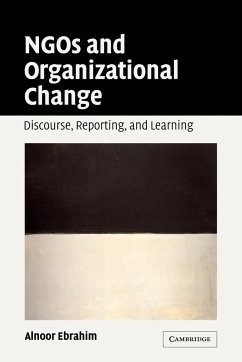Ebrahim analyses the organizational evolution of NGOs combining case studies with extensive review of literature.
The organizational dynamics of non-governmental organizations (NGOs) have become increasingly complex as they have evolved from small local groups into sophisticated multinational organizations with global networks. Alnoor Ebrahim's study analyses the organizational evolution of NGOs as a result of their increased profile as bilateral partners in delivering aid. Focusing on the relationships between NGOs and their international network of funders, it examines not only the tensions created by the reporting requirement of funders, but also the strategies of resistance employed by NGOs. Ebrahim shows that systems of reporting, monitoring, and learning play essential roles in shaping not only what NGOs do but, more importantly, how they think about what they do. The book combines original case studies and research with an extensive review of literature. It draws from multiple fields including organizational behaviour, social and critical theory, civil society studies, and environmental and natural resource management.
Table of content:
List of figures; List of tables; Acknowledgments; List of abbreviations; Introduction; 1. The making of NGOs: the relevance of Foucault and Bourdieu; 2. The NGOs and their global networks; 3. NGO behavior and development discourse; 4. Interdependence and power: tensions over money and reputation; 5. Information struggles: the role of information in the reproduction of NGO-funder relationships; 6. Learning in NGOs; 7. Challenges ahead: NGO-funder relations in a global future; Notes; References; Index.
Hinweis: Dieser Artikel kann nur an eine deutsche Lieferadresse ausgeliefert werden.
The organizational dynamics of non-governmental organizations (NGOs) have become increasingly complex as they have evolved from small local groups into sophisticated multinational organizations with global networks. Alnoor Ebrahim's study analyses the organizational evolution of NGOs as a result of their increased profile as bilateral partners in delivering aid. Focusing on the relationships between NGOs and their international network of funders, it examines not only the tensions created by the reporting requirement of funders, but also the strategies of resistance employed by NGOs. Ebrahim shows that systems of reporting, monitoring, and learning play essential roles in shaping not only what NGOs do but, more importantly, how they think about what they do. The book combines original case studies and research with an extensive review of literature. It draws from multiple fields including organizational behaviour, social and critical theory, civil society studies, and environmental and natural resource management.
Table of content:
List of figures; List of tables; Acknowledgments; List of abbreviations; Introduction; 1. The making of NGOs: the relevance of Foucault and Bourdieu; 2. The NGOs and their global networks; 3. NGO behavior and development discourse; 4. Interdependence and power: tensions over money and reputation; 5. Information struggles: the role of information in the reproduction of NGO-funder relationships; 6. Learning in NGOs; 7. Challenges ahead: NGO-funder relations in a global future; Notes; References; Index.
Hinweis: Dieser Artikel kann nur an eine deutsche Lieferadresse ausgeliefert werden.








